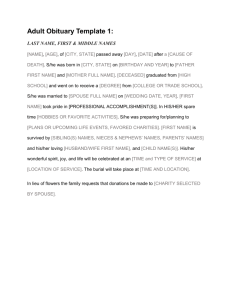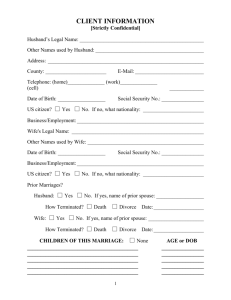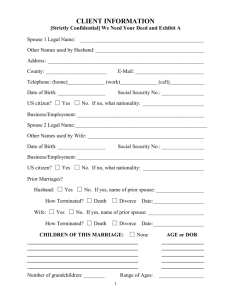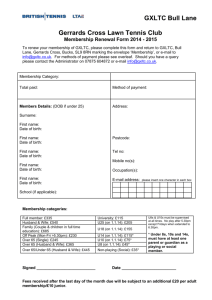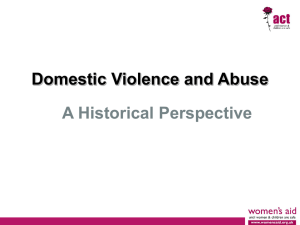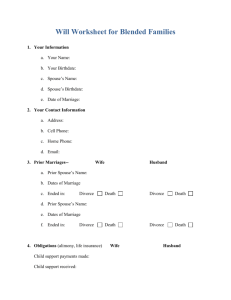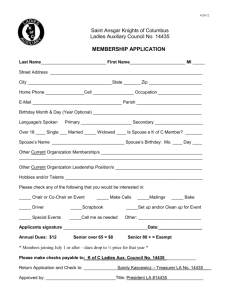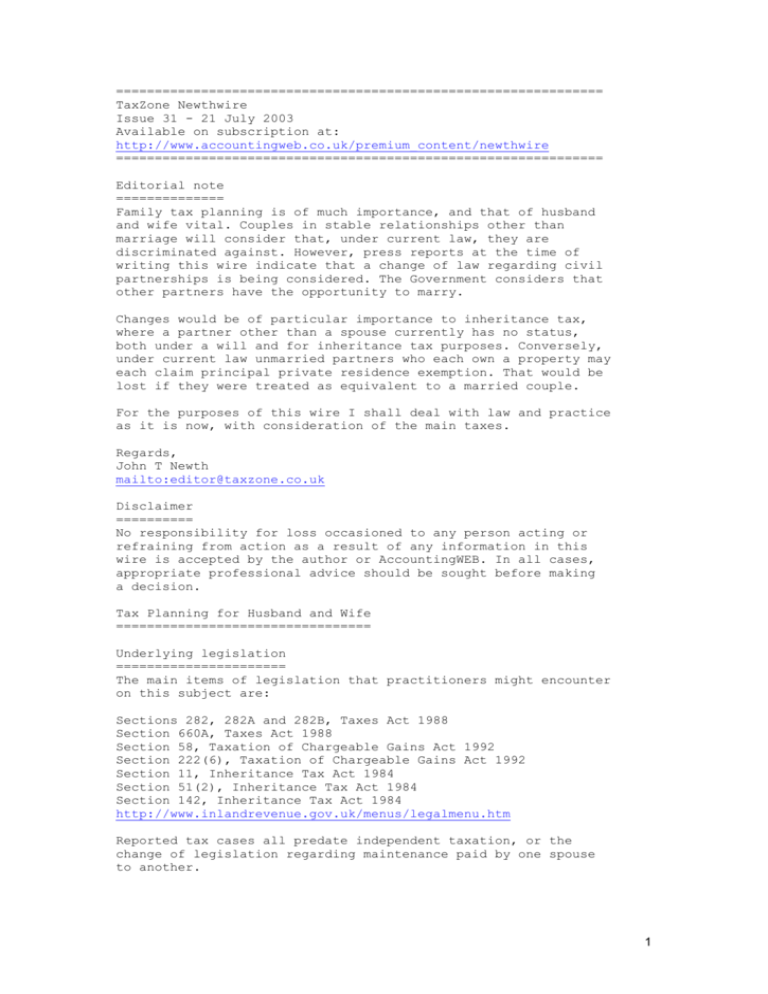
===============================================================
TaxZone Newthwire
Issue 31 - 21 July 2003
Available on subscription at:
http://www.accountingweb.co.uk/premium_content/newthwire
===============================================================
Editorial note
==============
Family tax planning is of much importance, and that of husband
and wife vital. Couples in stable relationships other than
marriage will consider that, under current law, they are
discriminated against. However, press reports at the time of
writing this wire indicate that a change of law regarding civil
partnerships is being considered. The Government considers that
other partners have the opportunity to marry.
Changes would be of particular importance to inheritance tax,
where a partner other than a spouse currently has no status,
both under a will and for inheritance tax purposes. Conversely,
under current law unmarried partners who each own a property may
each claim principal private residence exemption. That would be
lost if they were treated as equivalent to a married couple.
For the purposes of this wire I shall deal with law and practice
as it is now, with consideration of the main taxes.
Regards,
John T Newth
mailto:editor@taxzone.co.uk
Disclaimer
==========
No responsibility for loss occasioned to any person acting or
refraining from action as a result of any information in this
wire is accepted by the author or AccountingWEB. In all cases,
appropriate professional advice should be sought before making
a decision.
Tax Planning for Husband and Wife
=================================
Underlying legislation
======================
The main items of legislation that practitioners might encounter
on this subject are:
Sections 282, 282A and 282B, Taxes Act 1988
Section 660A, Taxes Act 1988
Section 58, Taxation of Chargeable Gains Act 1992
Section 222(6), Taxation of Chargeable Gains Act 1992
Section 11, Inheritance Tax Act 1984
Section 51(2), Inheritance Tax Act 1984
Section 142, Inheritance Tax Act 1984
http://www.inlandrevenue.gov.uk/menus/legalmenu.htm
Reported tax cases all predate independent taxation, or the
change of legislation regarding maintenance paid by one spouse
to another.
1
Other resources
===============
Among the Inland Revenue Manuals is the Independent Taxation
Manual, which comprises IN1-IN1575. Much of the material relates
to now obsolete legislation.
http://www.inlandrevenue.gov.uk/manuals/inmanual
Other Inland Revenue material includes:
=======================================
Extra-Statutory Concession D3
Extra-Statutory Concession D6
Statement of Practice SP D9
Revenue Interpretation RI 15
Inland Revenue Press Release 21 November 1990
Resource provided by the professional publishers include:
=========================================================
Butterworths Taxation of the Family by Philip Wylie
Excerpts, chapters or sections in:
# Tolley's Tax Planning for Private Residences by Matthew Hutton
# CCH CGT and The Private Residence by David Williams
# Tolley's Income Tax
Income tax
==========
Since the inception of independent taxation husband and wife
have been treated as separate persons in all respects for income
tax purposes, with their own personal allowance. Except for
certain pensioners the married couples' allowance is now
abolished. However the following points should be noted:
# Certain personal allowances have now been withdrawn and are
replaced by the Tax Credit regime. See the Tax Credit zone on
TaxZone for further details. Generally speaking Tax Credits are
awarded on the basis of family income, whether this is husband
and wife, partners who live together or single parents.
# The blind person's allowance (1,510 for 2003/04) may be
transferred from one spouse to another to the extent that the
allowance exceeds the total income of the claimant.
# Where one spouse is not a taxpayer, but receives taxed income
such as bank or building society interest, a claim for repayment
of tax should be made and/or certificate of non-taxability
signed as regards that particular source of income.
# Where interest relief is claimed on a loan taken out jointly
by husband and wife, it may be that only one spouse satisfies
the qualifying conditions for the loan. Revenue interpretation
RI 15 makes it clear that in such circumstances if the interest
is paid by the qualifying spouse, even if out of a joint bank
account, relief will be granted to that spouse.
Transfer of income
-----------------The effect of sections 282, 282A and 282B, Taxes Act 1988 is
that, normally, income arising from jointly held property is
regarded as accruing equally to each spouse.
However, where the actual property is held other than in equal
shares, husband and wife may make a joint application on
2
Form 17 to the effect that the income from the property should
be apportioned between them on the basis that they hold the
property. The declaration has effect from the date of the
declaration and continues to have effect unless and until the
beneficial interests of the spouses in either the income of the
property or the property cease to accord with the declaration.
Transfers of property between spouses has been a popular tax
planning measure in instances where one spouse pays higher rate
tax and the other doesn't. However, such transfers must be
effected properly, be real and each party should recognise the
implications of what could be an irrevocable gift. Property in
this connection includes shareholdings as well as residential
and commercial buildings.
The family business
------------------The family business often involves both husband and wife, and
may incorporate a measure of tax planning. Specifically:
# A sole trader may employ the spouse in the business. The
salary paid is a legitimate expense, provided that the amount
can be justified on the basis of work done. It must also be
actually paid – a book entry is not sufficient (see the leading
case of Moschi v Kelly).
# It is possible to arrange a pension scheme solely for the
spouse, and even if the salary is less than the direct tax
exemption limit and lower earnings limit for NIC.
# Some family businesses involve partnerships between spouses or
companies. The benefits of incorporation have been well aired
elsewhere, but it should be noted that the Inland Revenue may
attack the status of the business on the basis of the
'settlements' provisions in section 660A, Taxes Act 1988. The
basis of this attack is that one party has gifted bounty for no
consideration in the form of partnership share or shareholding,
and that the other party does not contribute meaningfully to the
earning of the income of the business. Accordingly, for tax
purposes, the arrangement is a 'sham'.
Tax raids on small companies Pt I
http://www.accountingweb.co.uk/item/105154/786/784/785
Tax raids on small companies Pt II
http://www.accountingweb.co.uk/item/108307/786/784/785
Enquiries and investigations
---------------------------There are serious consequences to independent taxation, when one
party to the marriage is the subject of an Inland Revenue
Enquiry or investigation. The reason for this is that the
affairs of each party are confidential, both as regards the
Inland Revenue and perhaps as regards each other.
Where an Enquiry takes
the other party to the
may be revealed to the
did not want revealed.
on the presence of the
place, the inspector may wish to question
marriage, and confidential information
other spouse which the husband or wife
The Inland Revenue has no right to insist
spouse at an investigation meeting, but
3
their absence could prejudice the conclusion of the Enquiry either
way.
Most married couples will have nothing to hide from each other,
but that is not always the case.
Capital gains tax
=================
Each partner to a marriage has his or her own CGT exemption for
each year, currently 7,900 for 2003/04. Issues that arise for
couples mainly involve jointly owned assets such as the family
home, shares and the transfer of assets between spouses.
Specific points that arise are:
# Where a declaration of interests in income has been made
following the submission of Form 17 to the Revenue, it is
assumed that the declared split of interests is effective for
CGT purposes.
http://www.inlandrevenue.gov.uk/pdfs/form17.pdf
# Where a declaration has not been made, but it is clear that
the interests of the respective spouses are other than 50/50,
the gain should be reported to the Revenue on that basis. This
is despite the fact that income will have been assessed equally.
# In other cases where the spilt of ownership is not clear the
Revenue will normally accept that the spouses hold the property
in equal shares. Inland Revenue Press Release, 21 November 1990,
deals with these issues.
# Transfers between spouses living together are made on a 'no
gain, non loss' basis (section 58, TCGA 1992). Effectively the
consideration is equal to cost plus indexation. In some
instances where there is a disparity between the respective
incomes of the spouses, it may pay to transfer the asset a few
months before sale in order to save higher rate or basic rate
tax, or to take advantage of an unused annual exemption. It
should be noted that taper relief is calculated according to the
combined period of ownership. Care should be taken not to
transfer assets between spouses and then make an immediate sale,
as such a transaction could be attacked under anti-avoidance
legislation.
# Spouses living together may claim exemption on only one main
residence (section 222(6)(a), TCGA 1992).
Example 1
--------Frank is a higher rate taxpayer, and has used his CGT annual
exemption for the year. He owns an asset which cost 2,000, and
which is then sold for 9,900. For the purposes of this example
only, indexation and taper relief are ignored. The tax payable
is:
Chargeable gain 7,900 @ 40% = 3,160.
Frank's wife Jennifer has no income, and has not used her CGT
exemption. Six months before sale Frank transfers the asset to
his wife. Her tax position is:
Chargeable gain
7,900
4
Annual exemption 7,900
= Nil
Obviously this is an extreme example, and in practice the wife
is likely to have her own income. The impact of indexation and
taper relief would also have to be taken into account.
Private residences
-----------------Principal private residence relief has much relevance to married
couples. Two Inland Revenue Extra-Statutory Concessions give
relief in the following circumstances:
# Where the exemption depends on a job-related absence, the
conditions are satisfied in relation to the employment of one
party to the marriage (Extra –Statutory Concession D3).
# Where a married couple separate and one party leaves the home,
which is subsequently sold as part of the separation settlement,
the spouse who left the home prior to sale is regarded as
fulfilling the conditions of exemption provided the other spouse
has remained resident in the property (Extra-Statutory
Concession D6).
Another situation that demands attention is the scenario when,
on marriage, each partner currently owns a property. Post
marriage, private residence exemption can only apply to one
property, and decisions regarding the sale of either or both
properties must take into account potential gains, any election
made after marriage and the final 36 months exemption, which
will be available in every case. Other complicated
considerations apply on separation and divorce, and these, as
well as marriage generally, are explored in more detail in the
two books by Matthew Hutton and David Williams.
Inheritance tax
--------------Husband and wife are treated separately for inheritance tax
purposes, which means that they each have an inheritance tax
exemption limit of 255,000 currently. Each spouse also has an
annual capital gift allowance of 3,000, which can also be
backdated one year if no gifts were made in the previous year.
Where net income is sufficient gifts out of income may also
be made.
Another main principle of inheritance tax (see Newthwire No.5
regarding Protecting the Small Estate) is that capital transfers
between spouses are exempt, unless the transferee spouse is not
domiciled in the UK, when exemption is limited to 55,000 (not
grossed up).
Among the many inheritance tax provisions I would draw attention
to the following:
# Domicile of husband and wife are considered separately. A wife
no longer automatically acquires her husband's domicile.
# The gifts in consideration of marriage exemption of between
1,000 and 5,000 is available to both husband and wife, who are
treated independently for this purpose.
5
# It should be noted that under the Inheritance (Provision for
Family and Dependants) Act 1975 a court may order financial
provision for family and dependants out of the net estate.
# Under sections 11 and 51, IHTA 1984 dispositions for the
maintenance of a member of the family are not deemed to be
transfers of value for IHT purposes. This could include gifts to
a spouse, including a former spouse where there has been a
divorce, and gifts for the maintenance and education of a
natural or illegitimate child. Also provision for a disabled
child during the donor's lifetime.
Estate planning
--------------As indicated in Newthwire No. 5 the basic problem for many
families, particularly those living in the South East, is that
capital in excess of the IHT exemption is 'locked up' in the
family home. This does not present a problem on the 'first
death', but will do so eventually if the surviving spouse
continues to live in the property and leaves their estate to
members of the next generation.
The other problem associated with this is the possible need for
the provision of long tern care for either spouse. While
measures to mitigate potential IHT are correct in theory, it is
unwise to do so at the expense of taking control of finances
away from the older generation. Sadly, family relationships do
not always continue to prosper, and this must be borne in mind
when entering into radical IHT planning, particularly for the
smaller estate.
Having said that, the following are some of the possible
measures that could be considered:
# Severing the joint tenancy in the family home, so that each
spouse has an equal tenancy in common. Each marriage partner is
then free, in their will, to leave their share in the property
to the next generation, thereby saving potential IHT.
# Inserting legacies to the next generation in the will
equivalent to the nil-rate band of 255,000.
# Where these steps have not been entered into before death,
considering a deed of variation of the will under section
142, IHTA 1984.
# In medium sized and larger estates, the formation of
appropriate discretionary or other trusts.
Some examples of the potential IHT that could be saved are set
out in Newthwire No.5. Before entering into any radical steps as
outlined above it is essential that expert professional advice
is obtained and that each family member receives independent
professional advice as to the consequences of any IHT planning.
National insurance and state pensions
=====================================
One of the issues that a married couple may have to decide is
whether or not one spouse should pay voluntary contributions, if
they are not obliged to. Where both wife and husband are
6
employed and subject to Class 1 primary contributions there is no
problem.
The problem arises when one spouse is not employed. The
retirement date for women for State Pension purposes is now
changing, based on a transitional period. There is also the fact
that a married woman is still able to claim the married woman's
State Pension based on her husband's contributions.
It is possible to obtain a retirement pension forecast from the
Contributions Agency, and this may help any decision in this
respect. A married woman may well receive credits for certain
years based on family responsibilities. On the basis of the
forecast a better appreciation of whether to pay voluntary
contributions will emerge.
Any Answers
===========
IR35 and unmarried couples
-------------------------Graham Rawlinson asked, in a query dated 2 June 2000, whether
unmarried couples living together would be treated as connected
persons for the purposes of IR35. Gary Mackley Smith referred to
paragraph 21(4) of the draft Schedule 12 to confirm that this
was so, but 'Andrew' observed that the legislation did not
extend to same-gender couples.
http://www.accountingweb.co.uk/item/18514/786/784/785
Partnership Dissolution
----------------------I will not attempt to précis Ian Davidson's query of 12 February
2002, but it is a cautionary tale that began when the respective
wives of two partners in a specialised trade were taken into
partnership purely for tax reasons. One couple then divorced and
it was decided to buy out the two wives from the partnership.
Great difficulties then arose from the divorcing wife and her
solicitor, regarding which Ian needed advice. This included the
valuation of the business when dissolution of the partnership
was deemed to take place.
My comment on this is that it is very dangerous to make business
decisions on tax grounds alone. It is even more dangerous if
family relationships are involved.
http://www.accountingweb.co.uk/item/71902/786/784/785
Husband & Wife
-------------Nicholas Myles observed, in his query of 9 August 2002, that he
was receiving conflicting advice from different Tax Districts
where a husband and wife owned their main residence jointly and
rented out a flat at the top of their house. Could the wife, who
had no other income, elect for all the rental income to be
treated as hers and could this be done by disclosure on the tax
return or was an election needed? In addition if the couple took
in lodgers under the rent-a-room rules and they exceed the
income limit, can the wife treat the income as hers?
'Red Queen' drew attention to a little known provision that
prevents two people claiming rent-a-room relief for the same
property, other than by halving the relief for each person.
7
As regards the top floor letting Neil Eglintine suggested that
if the wife owned the house, then either the income would be
taxed as hers or split 50/50. If the house is owned 75% by the
husband and 25% by the wife, the options are 50/50 or 75/25. I
would add that, as the house is owned jointly, no election is
necessary for a 50/50 split of income. However, if the wife's
share of the capital is greater than her husband's, then if it
is required to mirror this for income tax purposes, then an
election on Form 17 is required.
http://www.accountingweb.co.uk/item/88217/786/784/785
Husband/wife dividends and S660
------------------------------On 4 April 2003 Janet Pilborough-Skinner posed a query about
the current attitude of the Inland Revenue to section 660 and
its application to the shares of family companies. She had
always considered that different classes of shares in a family
company were OK as long as they ranked pari passu. She had been
informed that the transfer of shares between spouses was a
'no-no' unless the donee spouse paid the full market value.
Could redesignation of existing founder shares as A shares and B
shares be attacked by the Revenue? Does it matter how involved
the spouse is with the business? Does the size of the spouses'
shareholdings matter? If a wife owns 1% of B shares and the
husband owns 99% A shares can I really safely pay 30,000 pounds
out to the wife?
No one answered these questions, but I would answer 'yes' to the
first three questions and 'no' to the fourth. There are two main
issues here. The first is 'bounty'. If the husband gifts to the
wife a valuable tranche of shares, that is one part of it. The
other aspect that the Revenue are looking at is where the spouse
contributes little to the business in the way of technical
ability or money earning, but receives substantial remuneration
or dividends. On both these counts the Revenue state that they
may invoke the 'settlements' legislation.
The Department also states that there is nothing new about this,
and that the Revenue's position has not changed. One must
question this, and the suspicion is that senior officials have
woken up to the fact that very great advantages have been given
to small companies with the reductions in corporation tax rates.
Accordingly the Revenue must try and get some of its money back.
Am I being too cynical?
http://www.accountingweb.co.uk/item/107208/786/784/785
Ask a question
==============
Readers with a current case should post their query in Any
Answers.
JOHN T NEWTH
http://www.accountingweb.co.uk/premium_content/newthwire
Subscription Information
========================
Update your subscriptions by visiting the Profile page and
selecting the "My Services" link.
http://www.accountingweb.co.uk/profile
8
Copyright (C) 2003 TaxZone. All rights reserved.
================================================================
TaxZone, 100 Victoria Street, Bristol, BS1 6HZ
Tel:+44 117 915 9600 Fax:+44 117 915 9630
http://www.taxzone.co.uk
================================================================
9



